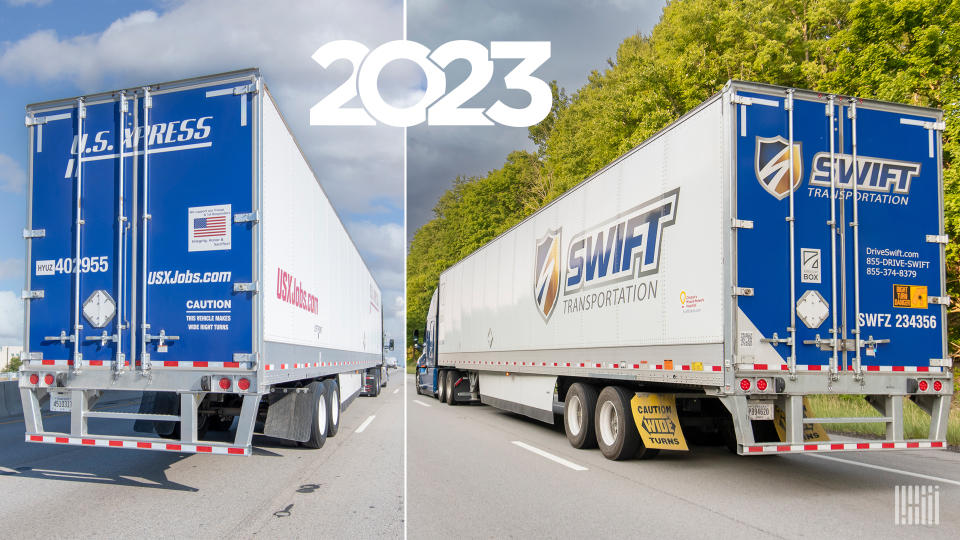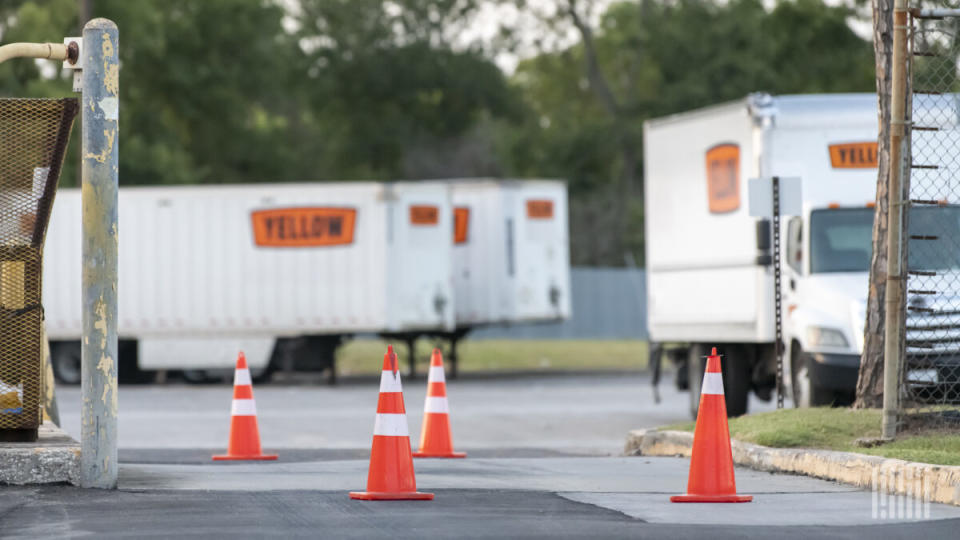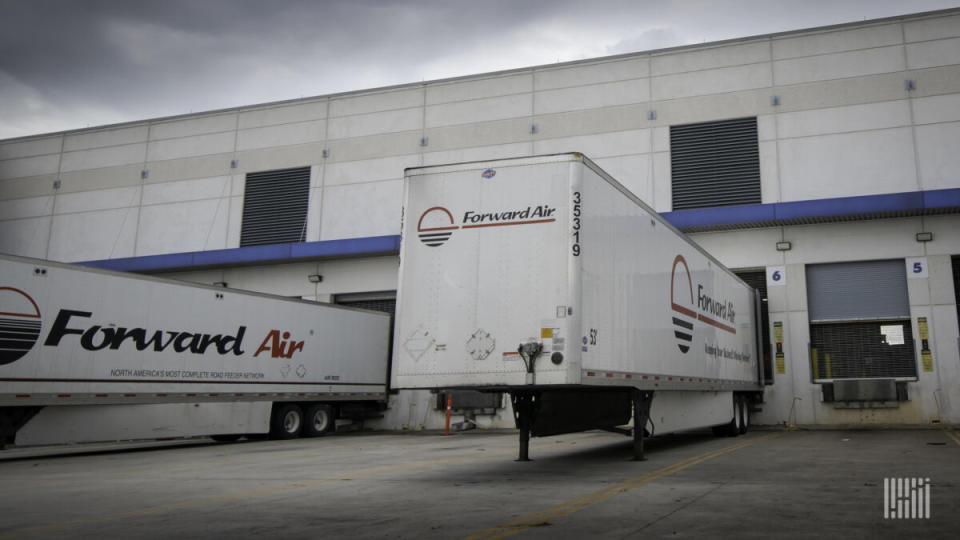2023’s most notable deals in trucking

Trucking M&A was tepid again in 2023 as freight demand slowed. Interest rates stepped higher, which proved a hindrance to deal financing, and tightened credit markets were met by still lofty valuation expectations from sellers.
Through the first week of December, transportation and logistics deal flow was off 2% year over year following 2022’s notable pullback, according to supply chain M&A advisory firm Left Lane Associates. However, companies generating significant cash flow did use M&A to offset weak organic growth.
There were some notable deals in trucking during the year, however. Here’s a recap in chronological order.
Knight-Swift acquires U.S. Xpress
After amassing a nearly $1 billion less-than-truckload platform through two separate deals in 2021, Knight-Swift Transportation (NYSE: KNX) got back to its truckload roots in March, announcing the acquisition of carrier U.S. Xpress in an $800 million-plus deal.
The transaction was booked at nearly 14 times trailing 12 months’ adjusted earnings before interest, taxes, depreciation and amortization, but closer to just 5 times on a forward-looking basis inclusive of deal synergies.
Knight-Swift’s management team has again put its operational chops to the test. It acquired struggling and highly leveraged Swift Transportation in 2017. That $6 billion merger created the largest fleet in the nation. While not as large, U.S. Xpress presents a difficult challenge as it had been operating at a loss.
U.S. Xpress is expected to add $2.2 billion in annual revenue to Knight-Swift’s platform, most of which comes from an asset-based fleet of 7,200 tractors (1,000 of which were provided by owner-operators at the time of the deal) and more than 14,000 trailers. Knight-Swift is now expected to produce $10 billion in revenue with a combined TL fleet of more than 24,000 tractors and 96,000 trailers.
Knight-Swift cut its full-year 2023 earnings guidance when it reported second-quarter results in July. The change was in part due to an expected negative impact from the integration of U.S. Xpress (closed on July 1). By the third-quarter report in mid-October, however, it told investors that the integration was ahead of schedule. The company said it had already achieved a $100 million annual run rate in cost and revenue synergies, with a line of sight to a $120 million run rate by year-end.
The acquisition is expected to produce an operating profit in the first half of 2024 and be accretive to full-year earnings per share. U.S. Xpress is expected to add $1 to EPS by 2026.
U.S. Xpress’ multiyear struggle ends with acquisition by Knight-Swift
Knight-Swift to remain on M&A prowl, still looking at LTL targets
Knight-Swift lowers Q2 expectations, closes on U.S. Xpress deal
Schneider builds out dedicated operation
Schneider National (NYSE: SNDR) made an M&A splash again in August, acquiring dedicated carrier M&M Transport Services. The deal added 500 trucks and 1,900 trailers, most of which operate in the Northeast, Midwest and Southwest.
Financial terms were not disclosed but Schneider said the deal would be immediately accretive to earnings. The transaction pushed Schneider’s dedicated fleet to nearly 6,500 tractors and $1.5 billion in revenue.
The company plans to acquire a dedicated carrier every 18 months in addition to organic fleet additions of 300 to 500 trucks annually (net of customer churn). The dedicated unit has accounted for 58% of Schneider’s 2023 year-to-date TL revenue.
Schneider acquired two dedicated carriers in 2022. It added Midwest Logistics Systems and its 900 tractors operating throughout the central U.S. in a $263 million deal, and regional operator deBoer Transportation, which onboarded 160 tractors.
Forward Air, Omni merger still in limbo
Forward Air (NASDAQ: FWRD) shocked Wall Street in August when it announced plans to merge with freight forwarder Omni Logistics in a $3.2 billion deal (roughly 18 times trailing adjusted EBITDA excluding deal synergies). The strategic merits of the acquisition, the large price tag and the fact that shareholders would not be given a vote ahead of closing were some of the reasons the stock sold off more than 40% following the announcement.
The debt-and-equity transaction would be 38% dilutive to existing shareholders and push the asset-light LTL provider’s debt leverage (net debt-to-trailing 12 months’ adjusted EBITDA) to roughly 4 times at closing.
Some of Forward’s large, institutional holders have openly criticized the merger and called on the company to terminate the transaction. A group of smaller shareholders have attempted to block the deal in a Tennessee court, claiming damages and saying they should be given a vote. Shares of Forward haven’t materially rebounded since the sell-off.
Forward originally said the addition of Omni, which is currently one of its forwarding customers, would allow it to remove the middle man and sell directly to shippers, thereby bolstering margins. Some of Forward’s longtime customers have questioned the deal’s impact as it positions Forward as both linehaul service provider and direct competitor. However, Forward said it has been able to grow volumes with those legacy forwarders since the announcement.
More recently, Forward alleged Omni had failed to meet certain pre-closing requirements and that the updated financial projections it provided were worse than expected. Forward has asked a Delaware court to let it out of the deal.
Omni maintains it has completed all prerequisites and that Forward is intentionally misconstruing its forecasts as a way to back out of the deal. It has asked the court to force Forward to the closing table.
A hearing on the matter is set for Jan. 19.
The deal price is currently closer to $2.6 billion given the sell-off in Forward’s shares.
Forward Air investor claims harassment by Omni after merger pushback
Forward files counterclaim against Omni, seeks path out of merger
Omni Logistics asks court to force Forward Air to closing table
Forward Air may terminate Omni deal even as court steps aside
Court extends temporary order blocking Forward Air-Omni deal
Forward Air sees muted August after controversial deal announced
Forward Air says ‘earned trust’ a must after Omni acquisition
Forward Air merges with Omni Logistics, will target expedited LTL
2 terminal auctions rake in nearly $2B for Yellow’s estate
The liquidation of defunct LTL carrier Yellow continues. In early December, the sale of 130 terminals netted the estate nearly $1.9 billion. Two weeks later the sale of 23 leased locations brought in $83 million.
Several LTL carriers have swooped in to take possession of the shuttered sites.
XPO’s (NYSE: XPO) $870 million acquisition of 28 terminals has been the largest of Yellow’s asset sales so far. All told, the deal added roughly 3,000 doors to XPO’s network of 17,000. The additions aren’t expected to be fully incremental as the carrier will be relocating operations to bigger and better terminals in some markets. XPO estimates that the transaction will net it 10% to 15% more doors.

Estes, which started the process with a more than $1.5 billion stalking horse bid for all of Yellow’s properties, has agreed to acquire 29 sites valued at $284 million. Saia (NASDAQ: SAIA) rounds out the top three bidders with commitments for 28 terminals at $244 million.
Proceeds from Yellow’s liquidation have exceeded the roughly $1.7 billion in debt held by secured lenders and the hedge funds providing bankruptcy financing. The estate is in the process of settling claims from unsecured creditors.
There are still 118 leased properties to be sold as well as 46 terminals that the company owns. The sale of its 12,000 tractors and 35,000 trailers through auction houses continues.
Estes’ $1.525B stalking horse bid for Yellow’s terminals wins out
First wave of Yellow terminals will go for $1.9B; sale process ongoing
‘Tremendous outcome,’ judge says in approval of Yellow terminal sales
Hub Group acquires Forward Air’s final-mile segment
Forward sold its final-mile operation to Hub Group (NASDAQ: HUBG) in December. The $262 million price tag for Forward Air Final Mile, which primarily arranges the delivery and installation of large appliances, included 46 locations and more than 640 employees. The segment generated $289 million in the prior 12-month period ended Sept. 30.
The transaction came amid uncertainty around Forward’s potential merger with Omni Logistics. The move could be viewed as an effort to clean up the balance sheet to make room for the debt load it would take on if that transaction were to proceed. However, Forward recently said it was undertaking a strategic review of its portfolio of businesses and potentially unloading operations not fully supportive of its growth initiatives in the premium LTL market.
Hub Group said the deal more than doubles its final-mile revenue and further diversifies its non-asset-based logistics offerings. It said the transaction will be immediately accretive to earnings in 2024.
TFI buys Daseke for $1.1B, eyes spinoff
TFI International (NYSE: TFII) announced a week before 2023 ended that it would buy flatbed truckload carrier Daseke (NASDAQ: DSKE) for $1.1 billion. The serial acquirer also said it was exploring a spinoff of its TL unit, which would create two separate publicly traded companies.
The purchase price represented a 69% premium to Daseke’s share price, valuing the entity at just under 6 times its 2023 adjusted EBITDA forecast.
A rollup of flatbed fleets, Daseke completed more than 20 acquisitions since being founded in 2009. The company grew from just 60 tractors generating $30 million in annual revenue to nearly 5,000 units and $1.8 billion in revenue. More recently, it had been undergoing a multiyear cost-cutting initiative to improve results and reduce its debt burden.
Under the deal, Daseke would continue to operate its various brands and report financial results through TFI’s TL unit. The deal would double the size of TFI’s TL offering, which has its management team contemplating a spinoff, with one company focused solely on TL and the other providing LTL, logistics, and package and courier services.
The acquisition is expected to close in the second quarter and be accretive to earnings in 2025.
Other notable deals involving public carriers
Forward Air expanded its expedited LTL footprint by buying Land Air Express for $56.5 million in January. The deal added more than 200 drivers and 300 power units, operating out of 25 terminals primarily located in the central U.S. The transaction was expected to add $84 million in annual revenue at the midpoint of the guidance range.

ArcBest (NASDAQ: ARCB) culled its product menu by selling its roadside and preventive maintenance unit, FleetNet America, to Cox Automotive for $101 million in February. FleetNet generated $343 million in revenue during 2022 with adjusted EBITDA of $7.7 million, implying a 13x trailing EBITDA multiple. The deal generated an after-tax gain of $51 million.
Covenant Logistics (NASDAQ: CVLG) acquired Arkansas dedicated poultry hauler Lew Thompson & Son in April for $100 million plus a potential earnout of up to $30 million. The carrier operates a fleet of 235 trucks and 400 trailers. The purchase price implied a valuation of 5 times adjusted EBITDA.
Mullen Group (TSX: MTL) added 400 trucks and 950 trailers when it acquired LTL and TL provider B. & R. Eckel’s Transport in May. The combination of the two Canadian carriers added CA$85 million ($64 million) in annual revenue to Mullen’s base of roughly CA$2 billion ($1.5 billion). The CA$44M ($33 million) price tag wasn’t large compared to other deals in the space, but it added a notable amount of equipment. It also advanced Mullen’s acquisition strategy of investing in companies with a strong regional presence and fleets that serve the energy sector.
Canadian transportation and logistics provider Titanium Transportation Group (TSX: TTNM) made its first acquisition in the U.S. In July, it acquired Georgia-based TL carrier Crane Transport. The $60 million deal included 200 trucks, two terminals and a trailer rental pool of 600 units.
J.B. Hunt Transport Services (NASDAQ: JBHT) acquired the brokerage operations of BNSF Logistics, a subsidiary of BNSF Railway (NYSE: BRK.B). The $85 million transaction closed in September and included the 3PL’s TL, drayage, expedited and LTL platform. In November, the two companies expanded a 34-year intermodal partnership, launching a premium service called Quantum.
Liquid tank hauler United Petroleum Transports (private) announced the $65.9 million acquisition of Patriot Transportation (NASDAQ: PATI) in November. Patriot subsidiary Florida Rock & Tank Lines hauls liquid and dry bulk commodities out of 19 terminals and other satellite locations with a fleet of more than 300 tractors and 400 trailers. The combination of the two companies creates a top 10 bulk tank carrier with over 1,000 drivers and more than 30 terminals in 11 states across the southern U.S.
Notable deals involving private companies
A large, regional LTL carrier was created in June when New York-based RIST Transport announced the acquisition of Massachusetts-based AMA Transportation. The combined operation has 15 terminals in the Northeast. The two had been operating as carrier partners over the past two decades.
Private equity firm ZS Fund acquired dedicated contract carrier Lily Transportation in July, which it paired with existing portfolio company Transervice Logistics. While the companies continue to operate separately, the transaction aggregated a much larger dedicated and brokerage platform touting 2,600 total employees (more than 1,750 dedicated drivers) managing 27,000 pieces of equipment out of 185 locations.
Mexico-based carrier Jaguar Transportation was acquired by a group of private equity firms led by Luminus Management in July. The cross-border operator has a fleet of more than 775 tractors and five trucking terminals across Mexico. Jaguar was previously a subsidiary of defunct U.S. carrier Celadon.
Private equity firm I Squared Capital created a 55,000-unit trailer leasing portfolio in September by combining Star Leasing with Commercial Trailer Leasing (Star Leasing was previously combined with North East Trailer Services). The combined entity now provides dry vans, reefers, liftgates and chassis throughout the U.S. through long-term leases.
Chassis pool manager Consolidated Chassis Management (CCM) was acquired by Oaktree Capital in October. CCM was previously owned by a group of 10 container shipping companies known as Ocean Carrier Equipment Management Association. The deal provided CCM with the funding to launch a new chassis pool, South Atlantic Consolidated Chassis Pool (SACP 3.0), which provides 45,000 units at more than 75 locations in Alabama, Florida, Georgia, North Carolina and South Carolina.
More FreightWaves articles by Todd Maiden
The post 2023’s most notable deals in trucking appeared first on FreightWaves.
